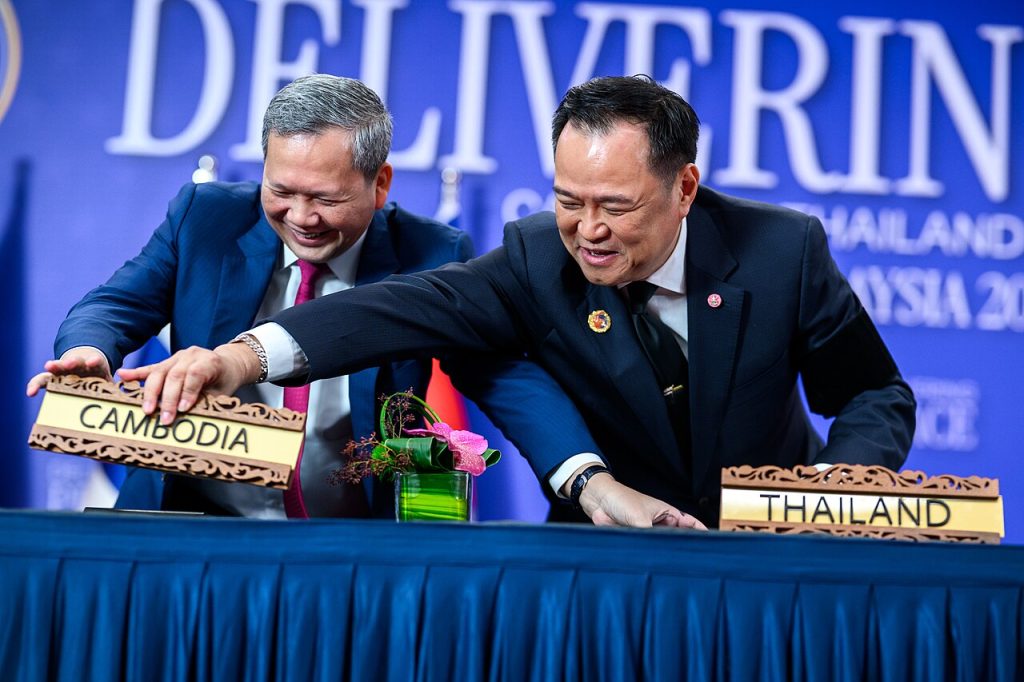The Cambodia-Thailand Border Dispute Remains Unresolved
Despite last month’s “peace accord,” it is only a matter of time before the dispute flares into conflict once more.
On October 26, Cambodia and Thailand signed a “peace accord” on the sidelines of the 47th ASEAN Summit in Kuala Lumpur, formally pledging to de-escalate the situation along their shared border, after a military confrontation in July that left at least 42 people dead and displaced more than 300,000. However, the fundamental points of contention have not been resolved, as demonstrated by the differing interpretations of the joint declaration issued at the Joint Border Committee meeting in Chanthaburi, which preceded the deal in Malaysia. Therefore, the decades-old dispute over the exact border demarcation has only been sedated, and there are indications that it is only a matter of time before it flares up again – even if the last period of calm lasted 14 years.
Kambodia alone in the anarchy of international relations
The origin of the conflict lies in the Franco-Siamese Agreement of 1907, which did not define the border between the present-day states of Thailand and Cambodia precisely enough and led to repeated localized conflicts in the decades following the end of French colonial rule. One could dismiss this border conflict as a problem solely between two neighboring states that have traditionally viewed each other with suspicion, and hope that it will not destabilize the region if it ever does escalate into a full-scale armed conflict.
One could also view it from the perspective of the foreign policy apathy of numerous international actors who are unwilling or unable to contribute constructively to a lasting peace. Above all, the Thai-Cambodian conflict once again highlights the lack of a regional power broker in Southeast Asia, contributing to a power vacuum in international relations that is filled almost at will by the de facto law of the strongest. Cambodia is a country that can hardly keep up with its neighbors in economic and military terms, and has received no significant diplomatic support in this unequal conflict.
It is remarkable in this context how little the international institutions created specifically for this purpose are willing to do to put a stop to this anarchy. In 2011, during the last clash on the Cambodian-Thai border, Cambodia appealed to the U.N. Security Council, which was perfectly understandable given Thailand’s aggression at the time. However, the Council more or less refused to take action and delegated the task to the Association of Southeast Asian Nations (ASEAN), which, due to Thailand’s veto, was unable to reach the necessary unanimity to develop a solution. And this year’s conflict has once again made it clear that ASEAN, as a regional power, was unable to prevent the armed conflict that had been looming for months.
Almost everyone looked away
In this respect, it would have been conceivable that other states could have stepped into this gap with diplomatic initiatives. However, apart from trite appeals for calm, these failed to materialize. Given the events of 2024, when Cambodia took actions that strained its bilateral relations with Vietnam, it is hardly surprising that its eastern neighbor held back from seeking a resolution to the Thai-Cambodian conflict.
Even more than Vietnam, Indonesia, by far the largest country in Southeast Asia and a member of the G-20 grouping, could have played a responsible role. But apparently, Indonesia’s entire foreign policy focus in recent weeks and months has been on the distant conflict in Gaza. Even China, Cambodia’s most important international partner with intensive cooperation and an enormous corporate presence, did not act as its protective power on the diplomatic stage. Unlike its immediate regional neighbors, however, China did exert pressure behind the scenes on both countries to resolve the conflict.
Many other countries that had invested billions in rebuilding Cambodia after the end of the Cold War also remained largely passive. India, Japan, and the European Union were conspicuously reticent, even though they certainly had the foreign policy potential to launch an effective diplomatic initiative, for example, through shuttle diplomacy. In particular, the EU, which is so interested in international relations based on principles of international law, could have contributed much more consistently to ensuring compliance with these principles.
What happened in Southeast Asia was not a conflict between two states, so typical in world politics, in which both had slipped into conflict mainly for domestic political reasons and harsh rhetoric. Instead, it was a locally limited attack by a larger, militarily superior country on the territorial integrity of a smaller, weaker neighboring state. The main difference compared to 2011 was that Cambodia defended itself aggressively, both militarily and diplomatically. The leak of a telephone conversation with Thailand’s Prime Minister Paetongtarn Shinawatra by Cambodia’s Senate President Hun Sen contributed significantly to the escalation of the conflict (and ultimately cost the Thai politician her job).
At the same time, the notion that the world’s attention was completely focused on the conflicts in the Middle East and Ukraine is refuted by someone who has played a central role in both of these conflicts and yet still threw his full weight behind resolving the conflict in Southeast Asia. U.S. President Donald Trump used his diplomatic weight to bring about an initial ceasefire on July 28, and insisted on being present in person at the signing of the peace accord on October 26. There is no question that the U.S. played a decisive role in preventing the border conflict from escalating further.
Industrialized Criminality
It remains unclear why Cambodia received so little international support in the face of such a threat. One obvious factor is the country’s domestic politics, which have been dominated for four decades by one man: Hun Sen, formally president of the Senate and leader of the ruling Cambodian People’s Party (CPP). Although Cambodia’s former prime minister (1985-2023) has handed over the reins of government to his eldest son, Hun Manet, he continues to make the key political decisions in Cambodia himself. Hun Sen’s ability to remain in power for so long is closely linked to his ability to reward his loyal supporters in the state, military, and party, and to his own emergence as one of the wealthiest individuals in Asia. This has always been based on legal, semi-legal, and illegal business models, with the proportion of mafia-like criminal activities increasing significantly in recent years. This primary example concerns cybercrime: together with Myanmar, Cambodia is now considered the global epicenter for cross-border online fraud.
According to estimates by American expert Jacob Sims, the scale of this industrialized economic crime is between $12.5 billion and $19 billion per year, equivalent to up to 60 percent of Cambodia’s gross domestic product. But it is not only those who have been defrauded of money who are victims, but also the scammers themselves. Around 150,000 people are said to have been lured to Cambodia with false promises of simple digital jobs and are currently being held against their will in isolated houses. Reports of physical abuse, including organ trafficking, torture, and murder in these forced labor camps, have been circulating for years. In some regions, especially in the cities of Sihanoukville, Bavet, and Poipet, foreigners, particularly those from other Asian countries, risk being kidnapped in broad daylight. The Prince Holding Group conglomerate has been identified as a major player in cybercrime activities. Its CEO, Chen Zhi, who has dual Cambodian and Chinese citizenship, has been proven to have close ties to Hun Sen.
International journalists reported from the Thai perspective
In fact, crimes of this magnitude would probably not be possible in the long term without the tolerance or involvement of state authorities. This would not be unusual for Cambodia: for years, the Bertelsmann Transformation Index has listed Cambodia not only as a “hard autocracy,” but also as one of the most corrupt countries in the world. However, this is no longer purely a domestic problem, as travel warnings from Asian countries in particular show. And with the seizure of more than $14 billion worth of Bitcoin owned by the Prince Group by U.S. authorities in mid-October, it should also have become clear to Hun Sen that the world is finally getting serious about tackling Cambodia’s number one export.
While endemic corruption and organized crime are severely damaging Cambodia’s international reputation, Hun Sen’s style of government also harms his country in other ways in the conflict with Thailand. Particularly striking during the heated phase of the military conflict was the perspective of international reporting, which was predominantly based in Thailand and initially tended to adopt the Thai narrative. Cambodian journalist Jay Sophalkalyan even criticized Cambodia for losing the “information war” with Thailand. The main reason is that independent journalists prefer to operate from Thailand because the regime in Phnom Penh has been steadily reducing freedom of expression and freedom of the press in its own country for years. The two Cambodian journalists Pheap Phara and Phon Sopheap were the latest to feel the effects of this hard line when they were arrested on July 31 for reporting on the border conflict and charged with treason in September.
Why Cambodia cannot keep up militarily either
Last but not least, the Thai military superiority over the Cambodians is not only due to the financial resources of a significantly larger economy, but also to the fact that Hun Sen has apparently made a conscious decision not to adequately equip his troops in the border region. No military unit is allowed to be better equipped than Royal Cambodian Armed Forces Brigade 70, which is personally subordinate to him (together with his bodyguard militia) and has been enforcing his claim to power for 30 years. The air force is even less competitive; unlike Thailand, which signed a contract with Sweden for the delivery of JAS 39 Gripen multi-role fighter jets in the midst of its border conflict, Cambodia has decided against such effective weapons. Apparently, a single jet pilot represents an incalculable danger for Hun Sen.
It cannot be ruled out that the government in Bangkok has arrived at a similar strategic assessment and recognized that the foreign policy risks of an offensive border conflict with Cambodia are manageable. And as long as Hun Sen sticks to the essential features of his corrupt, anti-liberal domestic policy, the number of Cambodia’s international sympathizers will not increase. The country will then have to face the next border conflict with Thailand on its own. And because no lasting solution has been found, it seems only a matter of time before it flares up again.
First published by The Diplomat


Thanks for this topic